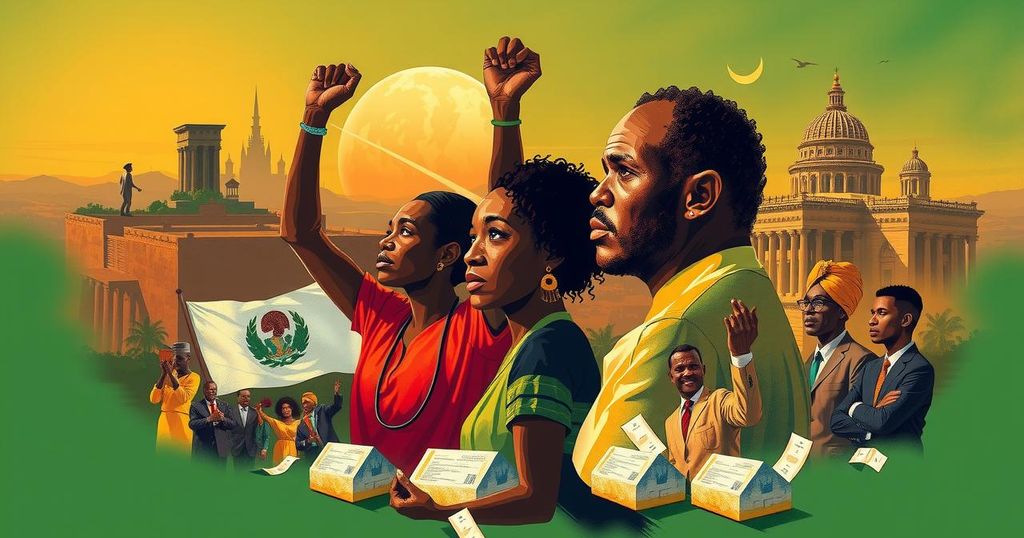June 12 and Its Abiding Spirit

June 12, 1993, was a turning point in Nigeria’s quest for democracy as millions voted for Chief MKO Abiola, only to have the result annulled by the military government. This led to a fierce struggle against tyranny, uniting diverse groups for the cause of democracy. Many sacrificed their lives and freedom for this fight, ultimately contributing to the resumption of democratic rule in 1999. The lessons from June 12 remain crucial for Nigeria’s future.
June 12, 1993, marked a pivotal turning point in Nigeria’s journey post-independence, as around 14.3 million voters made a historic choice for a civilian president. That day, citizens flocked to polling units nationwide, effectively ending a tyrannical regime. The key candidates were Chief MKO Abiola of the Social Democratic Party and Alhaji Bashir Tofa from the National Republican Convention. Abiola emerged victoriously with 58.4 percent of the votes – a notable act of unity amidst Nigeria’s diverse populace and an inspiring drive for democracy.
Noteworthy, the conduct of the election was monitored by at least 3,000 observers, both national and international, including 135 foreign representatives from developed democracies. Unlike previous elections in 1979 and 1983 that faced severe criticisms, the 1993 election was lauded for its fairness and credibility. Observers described it as “well-conducted, free, fair and therefore credible,” proving that this electoral process had put Nigeria on the map for democratic ideals.
However, the triumph of the people’s will was short-lived. General Ibrahim Badamosi Babangida’s military government annulled the election, disregarding the electorate’s choice and replacing it with an Interim National Government. This led to the chilling reign of General Sani Abacha, marked by repression and brutality that drove Nigeria into a deeper state of turmoil. It was a time that would set Nigeria back in its progress and tarnish its global reputation.
Instead of surrendering to oppression, the annulment of June 12 triggered a wave of activism across Nigeria. Various groups, from labor unions to civil society, emerged, unified against the tyranny. The National Democratic Coalition formed, transcending ethnic divides and rallying around the shared goal of restoring democracy. This struggle was not seen as a regional matter, but rather a fight for the soul of Nigeria as a whole.
The commitment to the June 12 cause saw the emergence of various leaders and courageous activists. Figures such as Pa Anthony Enahoro, Chief Bola Ige, and Chief Gani Fawehinmi became front-line warriors in this battle for democracy. Many paid the price, some with their lives, while others endured imprisonment and intimidation. Their sacrifices cemented their status as heroes of the June 12 struggle, and they are commemorated for their relentless pursuit of justice and democracy.
As the struggle continued, many influential figures, including some present-day leaders, like Senator Bola Tinubu, rose to prominence during this dark era, fighting without the backing of firearms. The violence against those advocating for democracy was relentless, with numerous innocent lives lost. This includes the heartbreaking murders of key figures like Alhaja Kudirat Abiola and Pa Alfred Rewane.
The media also played a crucial role in the fight, valiantly exposing brutalities with their pens. Journalists like Chris Anyanwu and others faced persecution for their commitment to the truth, reflecting on the harsh realities of the times. Those committed to defending democracy did not shy away from suffering hardship; instead, they brought attention to the plight of the oppressed, effectively writing the narrative of resilience against tyranny.
Reflecting on those times, I recall my own experience as a young attorney who aligned with those fighting for the restoration of the June 12 mandate. I remember the coordinated efforts to challenge the annulment legally, which resulted in direct threats to my safety. My journey into exile began when soldiers invaded my office under suspicion of harboring weapons, highlighting the regime’s oppressive tactics.
The tides changed in June 1998, as the oppressive regime was eliminated. Yet it was marked by the profound loss of Chief MKO Abiola, whose death symbolized a tragic end to the hope of democratic restoration. This ending, while somber, paved the way for an eventual transition to democracy in Nigeria on May 29, 1999.
Today, Nigeria’s political space is more participatory than ever, with rights being exercised freely. The legacy of June 12 remains significant, emphasizing the need for ongoing awareness and engagement with our democratic journey. Sadly, younger generations may not fully grasp its importance or the sacrifices made.
There lies a responsibility on us all, be it the government or civil society, to instill the lessons of June 12 into future narratives, preserving its spirit for generations to come. Our unity and commitment to democracy should not waver; rather, we must build a nation that serves its citizens effectively and equitably. The quest for a better Nigeria involves everyone—from the current government to the opposition—and requires the generation of credible alternatives to foster a functional democracy devoid of past divisive tendencies. The essence remains: true democracy is a collective journey.
June 12 serves as a significant historical marker in Nigeria, representing both the unyielding struggle for democracy and the sacrifices made by numerous individuals. The importance of this day is still relevant, illustrating the need for persistent civic engagement and remembrance of the past. For the country to move forward, it is crucial to embrace unity and commitment to democratic values that transcend ethnic and political divides. Continuing to honor the legacy of the June 12 struggle is essential for building a stable and lasting democratic framework in Nigeria.
Original Source: punchng.com







